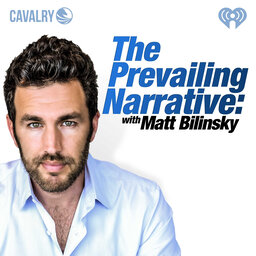Episode 26: Depp-Heard Trial Result and the ACLUs Role in Amber's Demise; NBC Expose' on Biden White House Troubles; NY Times Admits Mask Mandates Don't Work; Entrepreneur Justin Rezvani on Technology That Matters
0:12 - Jury rules (heavily) in favor of Johnny Depp. Looking at the societal factors and organizations (achem, ACLU) that encouraged Amber Heard to put herself in this position.
15:43 - Joe Biden's approval ratings are in the dumps - even worse than Trump. An NBC News expose' documents the President's stunned reaction to his troubled Presidency.
32:40 - NY Times' David Leonhardt pens a piece finally acknowledging that mask mandates don't work....just when some Blue states consider reinstituting indoor mandates.
41:55 - Justin Rezvani has found success in building social platforms. We discuss the principles that inform his new project Zion - which promises to revolutionize the open flow of content and payments using blockchain technology.
In 1 playlist(s)
The Prevailing Narrative with Matt Bilinsky
A lively and fiercely analytical breakdown of news and current events, with interviews of thought le…Follow podcast
Recent clips

Episode 30: "Dark Plots & Secret Explanations": Study Rejects "Chemical Imbalance" as Cause of Depression (Max Lugavere Discusses); Biden & His Media Surrogates Re-Define "Recession; Kansas Abortion Ruling; Zelensky Poses for Vogue(?!); Public Health Lies on Monkeypox
1:38:34

Episode 29: Kamal Ravikant - Silicon Valley Thought-Leader, Investor, & Bestselling Author on Loving Yourself, Stepping Past Fear, Extreme Sharing, Investing Skills, and Living a Life of Honesty, Adventure and Authenticity
1:12:12

Episode 28: Political Scientist Wilfred Reilly on Gun Control, Targeted Solutions, and the Facts and Myths About Gun Violence in America; Nihilism and Mass Shootings
1:44:29
 The Prevailing Narrative with Matt Bilinsky
The Prevailing Narrative with Matt Bilinsky